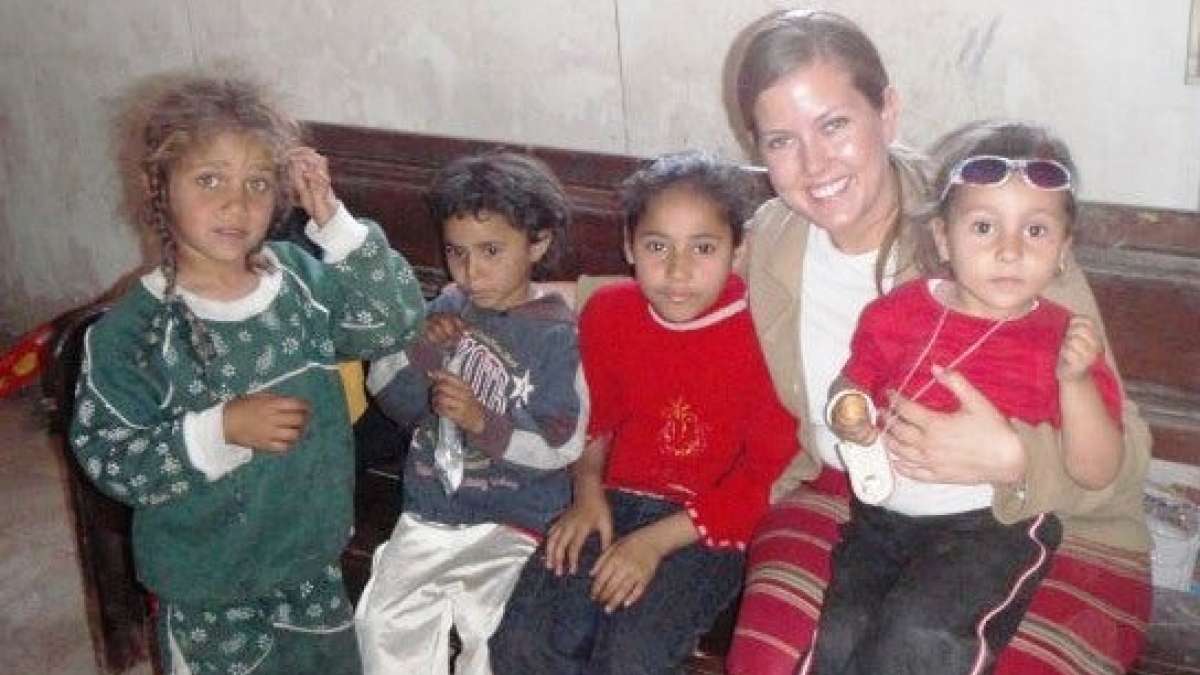When Danielle Wofford graduated with her associate degree in nursing, she did what many new grads do: She took an RN job at a local hospital and saved up some money. After five years at the hospital, she decided to shake things up and bought a one-way ticket to Europe.
While in Belgium, she volunteered at local refugee coffee shops and learned about the refugee experience by taking the time to listen to their stories. “That’s when I realized I had something to offer,” she said. “Even if it was just sitting and listening.”
In those coffee shops, Wofford was introduced to what would become her life’s work.
After four months in Belgium, she worked as a nurse and then went to Egypt where she volunteered for various health care projects. A friend told her about a cardiothoracic surgeon who was opening a non-profit cardiac hospital in the area that would provide free world-class cardiac care to the underserved — the first of its kind in the region, where all providers and staff would be trained to American Heart Association standards.
Wofford signed on and stayed with the Magdi Yacoub Heart Foundation in Aswan, Egypt, for three years.
During that time she assisted in building the cardiac center, participated on the research team that helped elevate health outcomes for heart patients, provided cardiac care for all ages, helped write the care delivery model for the center, reinvented their nursing education, overcame cultural barriers to empower local nurses and established a training center that continues her work today.
She also put herself through an RN-to-BSN program and taught herself to speak Arabic.
It was Wofford’s achievements in Egypt, and her commitment to serving vulnerable populations in Africa, Haiti, Eastern Europe and the Middle East, that earned her admission to the College of Nursing and Health Innovation’s BSN-to-PhD program, as well as pre-doctoral fellowships with the Hartford Center of Gerontological Nursing Excellence and the Transdisciplinary Training in Health Disparities Science program, funded by the National Institute of Nursing Research, National Institutes of Health.
“Her enthusiasm for learning and having a positive influence on society, and her unique focus on women’s health among refugee women,” earned her a spot in the PhD program, said Elizabeth Reifsnider, associate dean for research at the College of Nursing and Heath Innovation.
Wofford’s first paper as a doctoral student, “A Conversation with Calamity: Shedding Light on the Plight of Syrian Refugees,” co-authored with two research colleagues and published in the Journal of Health and Human Experience, is based on research that adapts a social ecological model as a framework to assess the Syrian refugee displacement experience.
Wofford analyzed data collected by her partners from multiple countries surrounding Syria and contributed information from her own interviews with refugee families who reside in the displacement zones surrounding Syria.
“The initial project focused on exploring wellness needs for refugees and quickly changed to outlining their displacement experience,” Wofford said. “After collecting and analyzing the data, we were overwhelmed with what we didn’t know about refugees’ daily struggles and changed our research trajectory.”
She learned that refugee women are often alone or with their children as they flee conflict, and many have PTSD and depression. She also discovered that of the 4 million Syrian refugees who have escaped conflict, less than 1 percent go through the lengthy process of entering developed countries. Most flee to nearby Turkey, Lebanon, Iraq, Egypt and Jordan.
“The average time a refugee is in a camp is 20 years,” Wofford shared. This discovery, and the fact that many refugees never make it to official camps, but are forced instead to find refuge where they can —under bridges or in dumps, prompted her to devote her research to the spaces in between the displacement zones.
Wofford, who was recently awarded a scholarship by the Jonas Center for Nursing Excellence for her interest in global leadership, is actively building bridges with communities of like-minded people in order to have a greater impact.
In February, she joined nurses from all over the world for the Fourth Annual Middle Eastern Nurses & Partners Uniting in Human Caring conference in Amman, Jordan, hosted by the Watson Caring Science Institute. She engaged with others on caring science and discussed her research.
Because of her knowledge of the unspoken realities that refugees face throughout the displacement and resettlement process, she was asked to write a position paper, “Equity and Equality of Medical Care for Refugees,” on behalf of the Nurses in the Middle East of the Watson Caring Science Institute.
Her insights also caught the attention of another participant — a nurse educator from New York and mentor with the United Nations, Dr. Holly Shaw, who invited Wofford to New York to present her research as a part of the Nightingale Initiative for Global Health at the UN's Commission on the Status of Women conference the following month.
Wofford spent five days in New York and presented on the last day of a weeks-long UN conference devoted to bringing issues to light that women face around the world. Dr. Jean Watson, the creator of the Theory of Caring Science, and an icon in Wofford’s eyes was to be honored that afternoon and was in the audience when Wofford presented her research.
During Watson’s ceremony, Wofford was asked to share what Watson’s theories have meant to her nursing career.
“I spoke about how Dr. Watson’s work impacted me as a nurse and how it will color my work as a future scholar,” she said. “Caring Science is the future of health care and nursing education globally. Love and kindness is the key to health.”
While she is deep into the second year of her doctoral program and works part-time as an RN, Wofford looks forward to traveling abroad next month and for the next two summers to continue her research — “sitting and listening” as she would say, to the community, her health care partners and the refugees, this time with funding provided by USAID.
“My ultimate goal is to advance nursing education and research in developing countries by focusing on the health and wellness needs of vulnerable populations,” she said. “I am a nurse at heart.”
More Sun Devil community

Tested tips for taking exams
With May quickly approaching, many students are starting to prep for their most important tests of the year — final exams.Toni…

School of Transborder Studies celebrates 15th anniversary
During the summer before his freshman year at Arizona State University, Salvador Macias participated in the AGUILA Youth…

Barrett program unlocks study abroad for first-year honors students
Twenty first-year students from Barrett, The Honors College at Arizona State University are spending their second semester…


